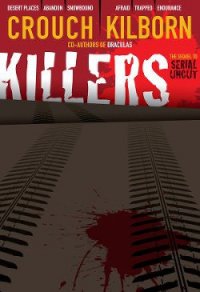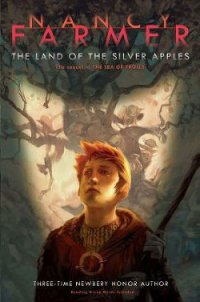The Sea of Trolls - Farmer Nancy (читать книги онлайн без TXT) 📗
“Did one of them send the Nightmare?” said Jack.
“One of them rodeit. Look, my boy, I was trying to protect you from certain things until you were older. But I may not have the time. Lately, I’ve felt a darkness over the sea. She’ssearching for me, you see. I can hide from her in the daytime. At night my guard is down, and she knows it.”
“You could move in with the chief, sir. He could protect you,” said Jack. He was beginning to get alarmed. This wasn’t a saga or an amusing song. This was real.
The old man shook his head. “Your chief is a brave man, but he isn’t up to handling trolls. Sheis hunting for me, and if she has found out where I am, her servants may already be on the way. I’ve been careless. I should have remembered that nowhere in the nine worlds is safe for me as long as she is abroad. I may even have to let her take me. Better that than let her destroy your village.”
“But can’t you flee?”
“Jotuns follow a trail like a hound. Her servants will come here first. If they don’t find me, they’ll kill all of you.”
“Jotuns?” Jack said faintly.
“It’s what the trolls call themselves. They can creep inside your mind and know what you’re thinking. They know when and where you’re going to strike before you do it. Only a very special kind of warrior can overcome them.”
“We have to do something.” Jack knew his voice sounded shrill, but he couldn’t help it.
“We will,” the Bard said firmly. “I’m on the alert now. I won’t let her catch me off guard again. I should have been teaching you all these weeks, but the peacefulness of this place lulled me….”
The Bard fell silent, and Jack saw him looking out to sea. He looked too, but he saw only cloudless sky and gray-green waves bending toward shore. If there was darkness out there, he couldn’t see it.
“You can go home for the next three days,” said the Bard. “I’ll be walking in the forest. Oh, and I wouldn’t mention any of this to your family.” He reached for his black staff. “We don’t want to alarm them until it’s necessary. Jotuns can follow a trail of fear as easily as foxes sniff out a henhouse.”
“I spend half my time chasing those scurvy boys,” said Father, slurping a bowl of Mother’s rich cockle soup. Jack had provided the cockles from sea cliffs near the Bard’s house. “They slide away like eels when there’s real work to be done.”
“Oh, aye. They’re a useless lot,” agreed Mother. She steadied Lucy’s hands on her mug.
Jack didn’t think the farm was suffering. The fences looked sturdy; the field was covered with oats and barley. Mustard, lavender, and coriander bloomed in the kitchen garden, and the apple trees were covered with tiny green fruit.
It was so beautiful, it made his throat ache. He’d never appreciated the little farm until now. And he saw his father in a new light. He realized that Giles Crookleg’s complaints meant no more than the muttering of crows in a tree. It was a habit crows fell into when things weren’t going their way. Father, too, grumbled by way of easing the disappointments in his life. What mattered was how Father went on in spite of his unhappiness, to create this beautiful place. Jack saw how lovingly the house was made, how carefully provisions were laid up so that Mother, Lucy, and he could survive.
It could all be swept away in an instant. No one had any idea of the menace lurking over the sea.
“Jack’s crying,” said Lucy.
“I am not,” Jack said indignantly. He turned his head away to hide the tears that had wandered down his cheek. He’d felt oddly shaken since the Bard had thrown him down. He seemed to cry more easily.
“Leave him alone, dearest,” came Mother’s soft voice. “His mouth is very sore.”
“The Bard thrashed him,” said Father.
“It was an accident,” Jack said.
“Oh, aye. You may tell us that, but I know a thrashing when I see one.”
Jack didn’t say anything. If it pleased Father to think he’d been punished, why spoil things? And this, too, was new. Before, Jack would have argued passionately. Now he saw the lines of pain in his father’s face, his hunched shoulders and scarred hands. The boy had a glimmer of another image, of his father as a child before the accident.
Jack felt like crying again. These new feelings were very odd and worrying.
Mother bent over Lucy’s fair head. “You must finish your soup,” she whispered.
“I don’t like the bottom part. It’s sandy,” said Lucy.
“Washing cockles takes away the taste,” said Mother, but she finished the dregs herself and gave Lucy an oatcake.
“Thrashing is good for boys,” Giles Crookleg said. “Why, I was smacked six ways to Sunday by my father, and it made me the man I am today.”
Then, because it wasSunday, Father told them a story about the holy saints. Father couldn’t read, nor could anyone in the village except the Bard. To Giles Crookleg, writing was a kind of magic. When the Bard marked letters on a scrap of parchment, Father always crossed himself to avert a spell.
But he had memorized dozens of stories from the monks of the Holy Isle. Tonight’s tale was of Saint Lawrence, martyred by pagans. “He was roasted over a slow fire,” said Father to Lucy’s horrified gasp. “They stuck garlic cloves between his toes and basted him all over like a chicken. When he was about to die and be taken into Heaven, Saint Lawrence said, ‘I think I’m done. You may eat me when you will.’ The pagans were so impressed, they fell on their knees and begged to become Christians.”
Trolls eat people,thought Jack. They would come over the sea and stick garlic cloves between everyone’s toes. He put his head down and thought about green hills and puffy clouds instead. He must not be afraid. Jotuns followed fear like a trail.
Later Lucy wanted to hear her own story of how she had lived in a palace.
“This will come to grief,” said Mother. “She can’t tell the difference between fact and fancy.”
Father ignored her. Jack knew he looked forward to the tales as much as Lucy did. The boy understood—how had he changed so much in a few weeks?—that these, too, were a comfort to his father. Giles Crookleg might grumble like a crow, but he lost himself like a bird in the clouds of his own imaginings. He no longer had to set foot on the earth or know that he was doomed to creep upon it.
“Once upon a time,” said Father, “the queen dropped a honey cake on the ground.”
“My other mother,” prompted Lucy.
Mother sniffed. She had long since stopped explaining that Lucy couldn’t have two sets of parents.
“It put down roots and grew,” said Father.
“Until it was as tall as the oak by the blacksmith’s shed,” Lucy said.
“Every branch was covered with honey cakes. Invisible servants flew through the air to fetch them.”
“Invisible servants! I’d like that,” said Mother.
“You had a little dog with a green collar with silver bells sewn on it. You could hear it running through the house.”
“Castle,” Lucy corrected.
“Yes, of course. Castle. And it could talk. It told you everything that went on in the kingdom, but alas, it was very naughty. The dog ran away, and the nurse ran after it.”
“With me in her arms,” said Lucy.
“Yes. She got lost in the woods. She sat down to weep and tear her hair.”
“She laid me under a rosebush first,” said Lucy.
“A bear came out of the woods and gobbled her up, but he didn’t find you, dearest.”
“And that was how I got lost,” crowed Lucy, not at all concerned about the fate of the nurse.
Jack fell asleep listening to the north wind fussing with the thatch over his head.
Chapter Four
THE VALLEY OF LUNATICS
The Bard’s face was tanned, as though he’d been out in the sun a long time. Jack wondered about it, but he hesitated to ask.




